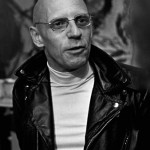Laura Mulvey | Born 1941

Mulvey’s main theory was entitled “Visual Pleasure and Narrative Cinema” and she made great political use of the theory Freudian psychoanalytic theory:
– in a patriarchal [society dominated by men] society ‘pleasure in looking’ has been split between active male and passive female. In other words the females are there to be looked at while the males are the ones doing the looking.
Mulvey believes that Hollywood not only traditionally focuses on a male protagonist but also assumes a male spectator. They expect that males are the only ones in the cinemas actually watching these films and that women would have no desire to be a lead role such as James Bond. Mulvey coined the term ‘the male gaze’ presenting ‘woman as image’ [or ‘spectacle’] and man as ‘bearer of the look’. This basically means that women are there to be looked at and visually enjoyed by men who are there to objectify and watch the women. In film women should be shown as sexy and more of a love interest or to be sexualised rather than a character with a proper background and personality, she is only there to be looked at and so doesn’t need to have a name or personal story or background.
– the narcissistic process of identification with an ‘ideal ego’ is given to both men and women. For example, the man will identify with the lead protagonist who is a strong and independent male that uses women and is cool, his comes across as the most masculine. The females will identify with the pretty love interest and happily watch her and see themselves in the position of the beautiful woman.
– men identify with the man who is using the woman as a fetishistic [the focus of an obsession] object.
– women gain pleasure from identifying with the beautiful woman in the film.
David Gauntlett | Born 1971

Gauntlett’s is a sociologist and media theorist who’s work expresses that creativity stems from self-identity and self-expression. He was a media professor at Bournemouth University and in 2006 he joined the School of Media, Arts and Design at the University of Westminster as Professor of Media and Communications. Gauntlett uses the depictions of masculinity, femininity and sexuality in a variety of media such as men’s and women’s magazines, television, film, popular music and self-help books. This is in attempts to explore how these representations impacts women’s and men’s self-identities in both the UK and the USA. Gauntlett presented debates on the power of the media providing an overview of past and contemporary representations of gender and sexuality in the means of media coverage; advertising, magazines, television and film.
A David Gauntlett essay:
Anthony Giddens | Born 1938

Anthony Giddens is a British theorist. He grew up in a lower middle-class family in London. Giddens completed a Bachelor’s degree in sociology and psychology at the University of Hull in 1959 and completed a Master’s degree at the London School of Economics and he got a Ph.D at the University of Cambridge. Giddens came up with the theory of structuration exploring the connection between individuals and social systems. He is a prominent contributor in the field of sociology and has 34 published books that have been translated in at least 29 languages. From 1998 to 2003 Giddens was the Director of the London School of Economics and still remains there as a professor. Giddens suggests the theory of structuration, a social theory of the creation and reproduction of social systems. This is based in the analysis of both structure and agents. Meaning that peoples social lives are more than just random individual acts and that there is in fact a social structure. This is in the traditions, institutions, moral codes and have established ways of doing things but it also means that these social standards can be changed when people start to ignore them, replace them or reproduce them in different ways.
Structuration theory: http://www.britannica.com/topic/structuration-theory
Judith Butler | Born 1956

Butler is a professor of Comparative Literature and Rhetoric at the University of California, Berkeley. She is well known as a theorist of power, gender, sexuality and identity. Butler came up with the “Queer Theory”, this grew out of feminism and gender studies in the 1990s. Her work combats negative representations of gay sexuality in the media and challenges the idea that gender is a fixed, immovable part of the essential life, as male or female. She suggests that male and female gender or sexual preference does not control all aspects of our identity, or how we perceive other peoples identity. Someones sexuality shouldn’t be/isn’t the most important aspect of a person and should not define what kind of person they are.
I agree with this theory as I think that stereotypes tend to scare people and make them think in a narrow-minded way. This theory develops stereotypes and simply states that this side of a person doesn’t define them and that audience’s shouldn’t judge someone just because of their sexual preference, this isn’t a definitive aspect of a persons personality, nor should it be.
Michel Foucault | Born 1926

Michel Foucault was a French historian and philosopher and is associated with the structuralist and post-structuralist movements. Foucault has had strong influence not only in philosophy but also in a wide range of humanistic and social scientific disciplines. Foucault was a major figure in two successive waves of the 20th century. The structuralist wave in the 1960s and then the poststructuralist wave. His work can generally be characterised as philosophically oriented historical research. Towards the end of his life he insisted that all his work was part of a single project of historically investigating the production of truth. Foucault tried to find a way of understanding the ideas that shape our present not only in terms of the historical function but also by tracing changes in their function throughout history.
About Michel Foucault: http://www.iep.utm.edu/foucault/
